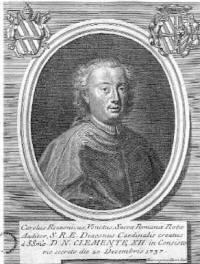Clement XIII.
Clement XIII. , Carlo (della Torre) Rezzonico , (born March 7, 1693 in Venice , Republic of Venice ; † February 2, 1769 in Rome ) was Pope from 1758 to 1769.
Life
Carlo Rezzonico was the son of a nobleman from Como who lived in Venice. On his mother's side he was related to the bishop and saint Gregorio Barbarigo . The Rezzonico family acquired the entry in the Libro d'Oro and thus the admission into the Venetian nobility in 1687 with a payment of 100,000 ducats. Before he was promoted to cardinal , he was papal chaplain and apostolic protonotary . In 1737 he became cardinal deacon of the titular deaconry of San Nicola in Carcere and was initially a member of various cardinal congregations, followed by the episcopal dignity of Padua in 1743 . In Padua, Cardinal Rezzonico placed particular emphasis on maintaining spiritual discipline among the clergy and the faithful. Benedict XIV praised him in 1746 as “one of the most worthy prelates we have in Italy”.
pontificate
On July 6, 1758, after a six-week conclave , in which there are said to have been many abstentions, he was elected as a compromise candidate for pope and took the name Clement XIII. on. He was a great friend and promoter of the Jesuits , which met with great rejection from many European powers. At the beginning of the pontificate, Clemens was neutral on the Jesuit question. A major concern was to raise the discipline and morale of the clergy.
On January 7, 1765, he solemnly confirmed the Jesuit order with the bull Apostolicum pascendi munus . For this he received criticism , especially from France and Spain . The European rulers demanded the dissolution of the Jesuit order and had partially expelled the Jesuits from their countries; in France, King Louis XV. shortly before that, on December 1, 1764, the order was banned by an edict .
In Rome he promoted the establishment of a German, a French and an English artist colony that dealt not only with religious topics.
As an opponent of the Enlightenment , Clemens XIII. the encyclopedia by Denis Diderot and Jean-Baptiste le Rond d'Alembert on the index .
In a dispute with the Spanish King Charles III. Clemens XIII threatened the Duchy of Parma , which both Clemens and Charles claimed for themselves. on January 30, 1768 with the excommunication of the Prime Minister of Parma Guillaume du Tillot, among others . This led to the expulsion of the Jesuits from Parma a week later.
For February 3, 1769 he called a consistory to discuss the current situation of the church. On the eve of this meeting, on February 2, 1769, Clemens XIII died. but surprisingly in apoplexy . After his death in Rome, among others, Cardinal Domenico Orsini d'Aragona spread the rumor that he had been murdered by the Jesuits because he wanted to consent to the dissolution of the order. However, the protocols received show that Clemens by no means had this intention.
Apostolic succession
The Apostolic Succession of Pope Clement XIII. is documented up to Cardinal Scipione Rebiba :
- Clement XIII.
- Benedict XIV.
- Benedict XIII.
- Cardinal Paluzzo Paluzzi Altieri degli Albertoni
- Cardinal Ulderico Carpegna
- Cardinal Luigi Caetani
- Cardinal Ludovico Ludovisi
- Archbishop Galeazzo Sanvitale
- Cardinal Girolamo Bernerio , OP
- Cardinal Giulio Antonio Santorio
- Cardinal Scipione Rebiba
literature
- Luigi Cajani, Anna Foa: Clemente XIII. In: Massimo Bray (ed.): Enciclopedia dei Papi. Volume 3: Innocenzo VIII, Giovanni Paolo II. Istituto della Enciclopedia Italiana, Rome 2000 ( treccani.it ).
- Friedrich Wilhelm Bautz : Clemens XIII .. In: Biographisch-Bibliographisches Kirchenlexikon (BBKL). Volume 1, Bautz, Hamm 1975. 2nd, unchanged edition Hamm 1990, ISBN 3-88309-013-1 , Sp. 1061-1062.
- Sydney Smith: Pope Clement XIII . In: Catholic Encyclopedia , Volume 4, Robert Appleton Company, New York 1908.
Web links
- Rezzonico, seniore, Carlo (1693-1769). In: Salvador Miranda : The Cardinals of the Holy Roman Church. ( Florida International University website, English)
- Entry on Clemens XIII. on catholic-hierarchy.org
- Works by and about Clemens XIII. in the German Digital Library
Individual evidence
- ↑ Secret and reliable story of the conclave and the election of the six last Popes, as: Benedict XIII. Clement XII. Benedict XIV. Clement XIII. Clement XIV. And Pius the VIth . Sonnleithner, o. O. [Vienna] 1782, p. 11 ( digitized in the Google book search).
| predecessor | Office | successor |
|---|---|---|
| Benedict XIV. |
1758–1769 |
Clement XIV. |
| personal data | |
|---|---|
| SURNAME | Clement XIII. |
| ALTERNATIVE NAMES | Rezzonico; Carlo; della Torre Rezzonico, Carlo |
| BRIEF DESCRIPTION | Pope (1758–1769) |
| DATE OF BIRTH | March 7, 1693 |
| PLACE OF BIRTH | Venice , Republic of Venice |
| DATE OF DEATH | February 2, 1769 |
| Place of death | Rome |


